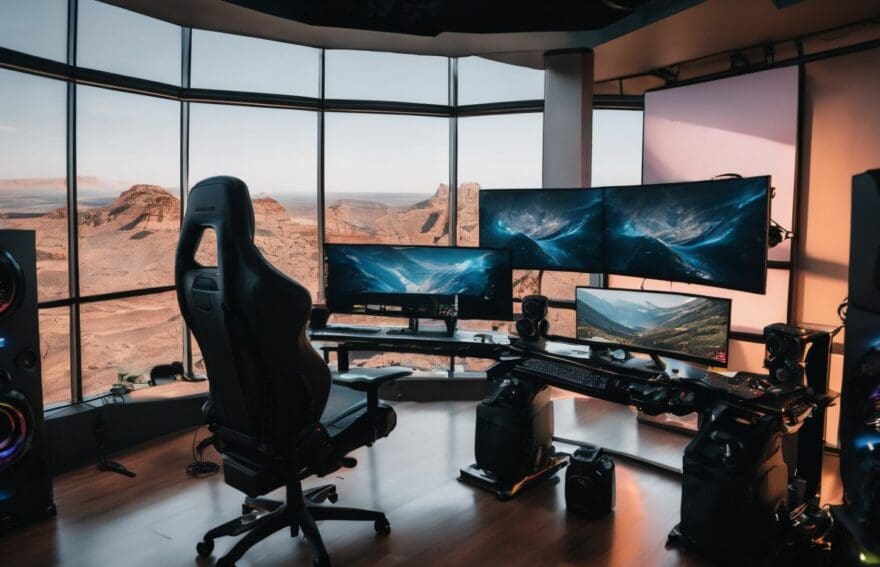Streaming and Influencing: Esports Stars Beyond the Game

Updated On: October 24, 2025 by James Connolly
Have you ever found yourself pondering the dazzling allure of esports champions, both during their digital showdowns and in their lives beyond? It’s quite the wonder to observe how these virtuosos wield influence that extends leagues past the pixelated arenas.
Picture a world where a single esports finale can captivate an audience of 70 million spirited onlookers—numbers that give even traditional sports a run for their money. Our blog is poised to be your companion through this electrifying realm, offering a window into how these adept gamers shape facets from media landscapes to fan experiences.
Prepare to learn about the spellbinding sphere of streaming and influencing—shall we take the plunge together?.
Understanding Esports and its Basics
Esports, short for electronic sports, refers to competitive video gaming at a professional level. With a wide variety of games like League of Legends, Overwatch, and Dota 2 taking the spotlight, esports has gained significant popularity in recent years.
The industry continues to grow as more players and fans join the community.
Definition of esports
Esports stands for electronic sports, where we see players compete in video game competitions. These events range from international tournaments to local matches, with players battling in various game genres like shooters, strategy games, and MOBAs.
We’ve watched the ecosystem grow rapidly as more fans flock to live streaming platforms to catch their favourite teams and players in action.
We’re part of a community that is shaping an entire industry around competitive gaming. With every match streamed online, millions tune in worldwide to witness breathtaking gameplay and strategic prowess.
The rise of esports has been meteoric; it’s not just a hobby but a legitimate career path with opportunities for us as players, influencers, content creators or behind-the-scenes tech experts powering this exciting digital arena.
Different types of esports games
As we delve deeper into the world of esports, it’s important to understand the wide array of games that fall under this category. Each type of game offers unique challenges and appeals to diverse audiences. Let’s explore the various types of esports games:
- First-person Shooter (FPS) Games:
- Multiplayer Online Battle Arena (MOBA) Games:
- Real-time Strategy (RTS) Games:
- Sports Simulation Games:
- Card Games:
- Other Genre-specific Esports:
Growth and popularity of esports
Esports continues to surge in popularity, with a growing number of avid gaming enthusiasts worldwide. The industry’s expansion is attributed to the rising appeal of competitive gaming and advancements in gaming technology.
Live video streaming has transformed the way games are experienced, as players can now broadcast their gameplay while engaging with viewers in real time, fostering a sense of community and camaraderie among fans.
Furthermore, projections indicate that esports viewership is on the rise, with an estimated 70 million people anticipated to watch a single esports final – surpassing viewership for UK professional baseball and football.
The esports sector is experiencing remarkable growth – not only witnessing an increase in viewership but also significant engagement from its audience. Livestreaming has become a pivotal intersection where video content and gaming merge seamlessly, contributing to an anticipated 31.6 million monthly esports viewers by 2023 across the UK alone.
The ascent of platforms like Twitch has played a crucial role in shaping gaming culture and nurturing immersive experiences for fans globally. Moreover, marketers have recognized the potential within this burgeoning industry – offering substantial opportunities for brand exposure and interaction with an ever-expanding audience.
The Global Impact of Esports
Esports has become a global phenomenon, bringing together players from all corners of the world and creating a cultural impact through international tournaments. The unity and camaraderie within the esports community transcend borders and highlight the power of gaming as a universal language.
Uniting players worldwide
Uniting players worldwide is a fundamental aspect of esports, bringing together individuals from diverse backgrounds and cultures through their shared passion for gaming. Esports serves as a global platform where gamers can connect, compete, and collaborate regardless of geographical boundaries or language barriers.
With the rise of online gaming communities and international tournaments, players have the opportunity to form friendships and build camaraderie with fellow enthusiasts from across the globe.
The inclusive nature of esports has led to an interconnected network of gamers who share similar interests, values, and aspirations. This sense of unity fosters a vibrant community where individuals can learn from each other, celebrate achievements together, and contribute to the overall growth and development of the esports industry.
Cultural impact through international tournaments
Uniting players worldwide has led to a significant cultural impact through international tournaments. Esports events bring together diverse communities, fostering a sense of global unity and camaraderie among gamers from different countries and backgrounds.
These tournaments showcase the rich tapestry of gaming cultures and traditions, allowing players to interact with one another on a global platform, promoting cross-cultural exchange and friendship.
Esports competitions serve as a melting pot where various nationalities converge, celebrating diversity through the shared love for gaming. International tournaments not only elevate individual skill but also highlight the unique characteristics of each participating region’s gaming scene.
The Role of Technology in Esports
Communication technology plays a crucial role in connecting players from all over the world, creating a global community. Furthermore, behind-the-screens technology powers the entire esports industry, driving its growth and overall success.
Communications technology bridging players across continents
Communications technology effortlessly connects players across continents, allowing them to engage in esports competitions and collaborate on a global scale. With the power of live video streaming and online gaming platforms, gamers from different corners of the world can communicate, strategise, and participate in tournaments without the constraints of physical distance.
This seamless integration breaks down barriers and fosters an inclusive environment where individuals from diverse cultures unite through their shared passion for gaming.
Globally accessible communication tools like Discord, Skype, and Teamspeak enable players to organise teams, discuss tactics, and build camaraderie regardless of geographical location.
Behind-the-screens: technology powering esports
In today’s esports landscape, the technology behind the scenes plays a pivotal role in shaping the gaming experience for players and viewers alike. Livestreaming, a significant component of this technological ecosystem, allows gamers to broadcast their gameplay across platforms like Twitch and YouTube Gaming.
This level of accessibility has not only increased engagement but has also created new career paths within esports, such as professional streamers and content creators who are influential figures in the gaming community.
Moreover, advancements in virtual reality (VR) and augmented reality (AR) technologies have propelled esports into an immersive dimension. With these innovations, spectators can experience games from entirely new perspectives – enhancing the flow experience synonymous with high-level competition.
Opportunities in the Esports Industry
The esports industry offers a wide range of opportunities, from careers in game development and design to professional gaming and content creation. With the growing popularity of esports, there is also an increasing demand for talented individuals who can bring their expertise to this dynamic and fast-paced industry.
Whether it’s creating engaging content or competing at the highest level, there are numerous avenues for passionate gamers to thrive in the world of esports.
Careers in esports
- Professional Gamer: Individuals can build careers as professional esports athletes, competing in tournaments and leagues at a global level.
- Content Creator: As streaming and influencing play significant roles in the industry, content creators can produce engaging gaming content for platforms like Twitch and YouTube.
- Event Management: Organising esports events and tournaments requires skilled professionals to handle logistics, production, and audience engagement.
- Marketing and Sponsorship: With the growth of esports as a marketing platform, there is a demand for professionals in advertising, brand partnerships, and sponsorships.
- Game Development: Talented individuals can pursue careers in developing video games specifically tailored for competitive esports play.
- Broadcasting and Commentating: Opportunities exist for individuals with strong communication skills to become broadcasters or commentators for live esports events.
Role of content creators
Content creators play a crucial role in shaping the esports landscape, producing engaging and informative content that resonates with audiences. Their videos, live streams, and social media interactions build communities and influence gaming culture.
With their online presence and digital influence, they shape behavioural intentions and contribute to the growth of video game culture. Livestreaming consumption has revolutionised how gamers interact with content creators, bringing them closer together as a community while broadening the reach of esports operations.
Their impact extends beyond the game itself, influencing not only passionate gamers but also novice gamers who are looking for guidance and entertainment within the gaming world. The role of content creators has become integral in showcasing both the competitive nature of esports and its appeal as an entertainment platform.
Professional gaming
Professional gaming offers exciting opportunities for skilled gamers to compete at the highest level and earn a living from their passion. With substantial financial rewards, sponsorships, and endorsements available, professional gaming has become a viable career choice for many dedicated players.
The rise of esports has also led to the development of structured leagues and tournaments, providing a platform for gamers to showcase their talents on a global stage. As digital influencers, professional gamers hold significant sway within the gaming community and beyond, shaping trends and influencing game choices among enthusiasts.
The growing popularity of online spectator demand has propelled professional gaming into the spotlight as an engaging form of entertainment. Through live video streaming platforms like Twitch, esports stars can interact with fans in real-time while showcasing their skills in popular titles such as League of Legends or Fortnite.
The Influence of Esports on Media and Fan Engagement
Esports has created a platform for building personal brands and engaging with fans, paving the way for the growth of esports in media. To learn more about the impact of esports on media and fan engagement, continue reading our blog.
Building a brand in esports
Esports provides a unique platform for brands to reach a large and engaged audience. With the increasing popularity of competitive gaming, companies have the opportunity to sponsor tournaments, teams, or individual players.
This exposure allows brands to connect with passionate gamers and novice enthusiasts, creating long-lasting impressions through in-game advertising and endorsements by esports stars.
For companies looking to tap into this growing market, partnering with influencers in the esports industry can lead to authentic connections with their target audience. By aligning with popular streamers or professional gamers who share similar values or interests as the brand, it becomes easier to build credibility and trust among gaming communities.
Potential and growth of esports in media
Esports is gaining traction in the media, with a projected 70 million people estimated to watch a single esports final. This surpasses viewership for U.S. professional baseball and soccer.
Twitch and similar streaming services are rapidly increasing in popularity, influencing gaming culture and experience. Livestreaming brings together video and gaming as one cohesive entity, enticing an estimated 31.6 million people in the US to watch esports at least once per month by 2023.
The growing influence of esports on media provides marketers with significant opportunities for brand exposure and engagement with a large and expanding audience. Esports has become a substantial market force that continues to impact the gaming and entertainment landscape, maintaining strong competition with traditional sports (Important Facts -#7).
Fan engagement and fandom
Esports fans enthusiastically engage with their favourite players and teams through live video streaming, creating a dynamic and interactive community. With platforms like Twitch, viewers immerse themselves in the esports world, interacting with streamers and other fans while witnessing thrilling gameplay.
This active engagement has propelled esports into popular culture, where 70 million people are projected to tune in for a single final – surpassing the viewership of U.S. professional baseball and soccer events.
The growth of fan engagement highlights the profound impact of esports on media consumption habits and indicates an exciting future for this flourishing industry.
The connection between esports stars and their devoted fan base is undeniable, symbolising the shift towards a more immersive gaming experience that transcends conventional entertainment boundaries.
Regulating Esports and Maintaining Fair Play
Ensuring fair play and integrity in esports is crucial for the growth and sustainability of the industry. Anti-cheat technologies and regulatory bodies are working to maintain a level playing field for all competitors, while upholding the values of sportsmanship and honesty in competitions.
Challenges in esports
Esports faces challenges in maintaining fair play and integrity. Anti-cheat technologies are crucial to ensure a level playing field, combating the use of cheats and hacks that can undermine the competitive nature of esports tournaments.
Upholding integrity in competitions remains a significant challenge, as the industry attracts increasing scrutiny over issues such as match-fixing and doping.
Furthermore, ensuring player well-being amidst intense competition is another pressing issue. Balancing rigorous training schedules with physical health needs is essential for sustaining long-term careers in professional gaming.
Anti-cheat technologies
Esports’ growth has sparked a demand for robust anti-cheat technologies. Gamers rely on fair competition, and the industry needs to ensure integrity in gameplay. As the esports audience continues to expand, game developers and tournament organisers are investing in advanced anti-cheat measures to maintain a level playing field.
This is crucial as cheating not only compromises fair play but also damages the credibility of esports as a competitive platform. Gamers expect a secure and genuine gaming experience, prompting continuous innovation in anti-cheat technologies to combat cheats effectively.
Game developers and tournament organisers understand that implementing effective anti-cheat solutions is essential for fostering trust among players and fans alike. The investment in cutting-edge technology underscores the industry’s commitment to upholding fairness and integrity within competitive gaming environments.
Upholding integrity in competitions
To maintain integrity in competitions, strict regulations and anti-cheat technologies are enforced to ensure fair play for all participants. Organisers implement measures such as real-time monitoring, player profiling, and behavioural analysis to detect potential cheating or unethical practices during esports events.
With the continuous development of advanced anti-cheat systems, players can compete on a level playing field without concerns about unfair advantages, fostering a more competitive and trustworthy environment within the esports community.
Furthermore, initiatives to standardise competition rules and guidelines across various games contribute to upholding integrity in esports. This not only ensures consistency but also promotes transparency and fairness for all participants involved in different competitions.
Additionally, educational programmes focused on promoting ethical conduct among players further strengthen the commitment to maintaining integrity in gameplay. These efforts collectively underscore the importance of ethics and sportsmanship in competitive gaming while enhancing the overall experience for both gamers and audiences.
Conclusion: Esports as a Cultural Phenomenon
Esports has evolved into a global cultural phenomenon, captivating millions of viewers worldwide. Influential esports stars are shaping the industry’s landscape through live streaming and engaging content creation.
The impact of esports goes beyond the game itself, influencing media, fan engagement, and even marketing strategies. This dynamic industry continues to redefine entertainment and holds significant potential for future growth.
FAQs
1. What does streaming mean for esports stars?
Streaming is when esports stars play games live online, sharing their experiences and skills with fans while influencing gaming culture.
2. How do esports players become influencers?
Esports players become influencers by building a following through engaging game streams, offering tips and interacting with the community to impact opinions and trends in gaming.
3. Can watching streams help improve my gameplay?
Yes, watching streams of esports stars can give you insights into strategies and techniques beyond the game that can significantly enhance your own gameplay.
4. Why are esports stars important outside of competitions?
Esports stars hold influence as they shape gaming trends, endorse products, interact with fans on social platforms, and often have a say in how the gaming community evolves.








